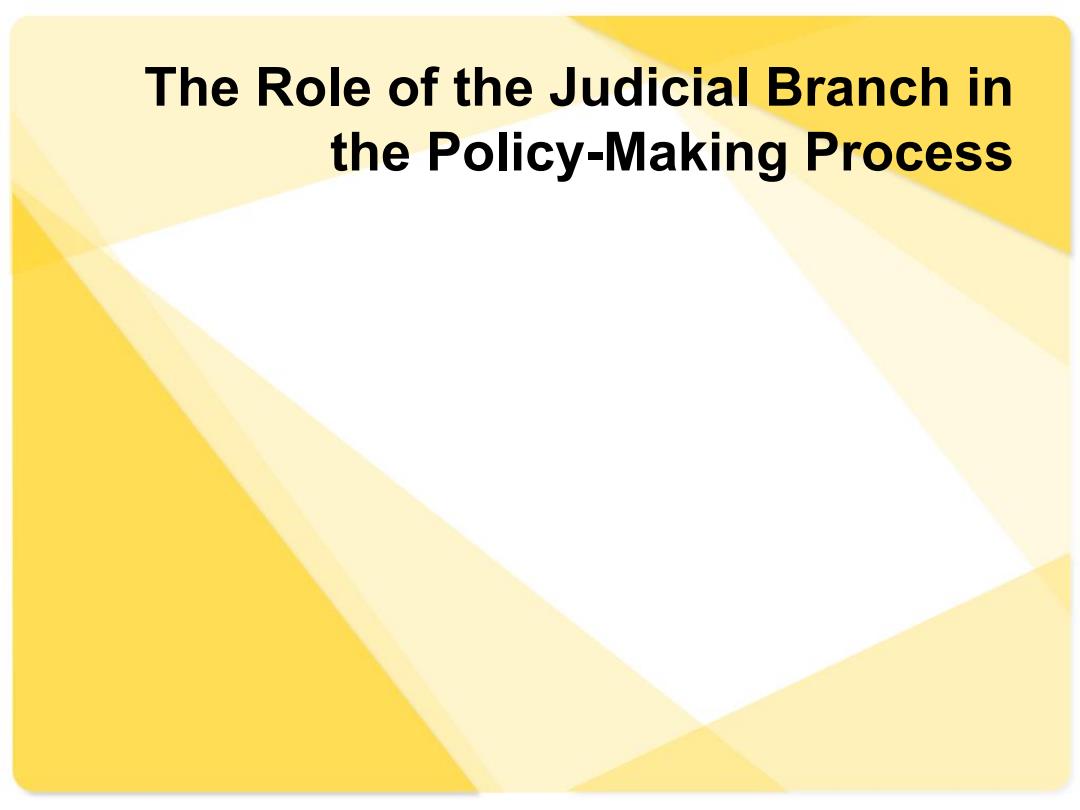
The Role of the Judicial Branch in the Policy-Making Process
The Role of the Judicial Branch in the Policy-Making Process
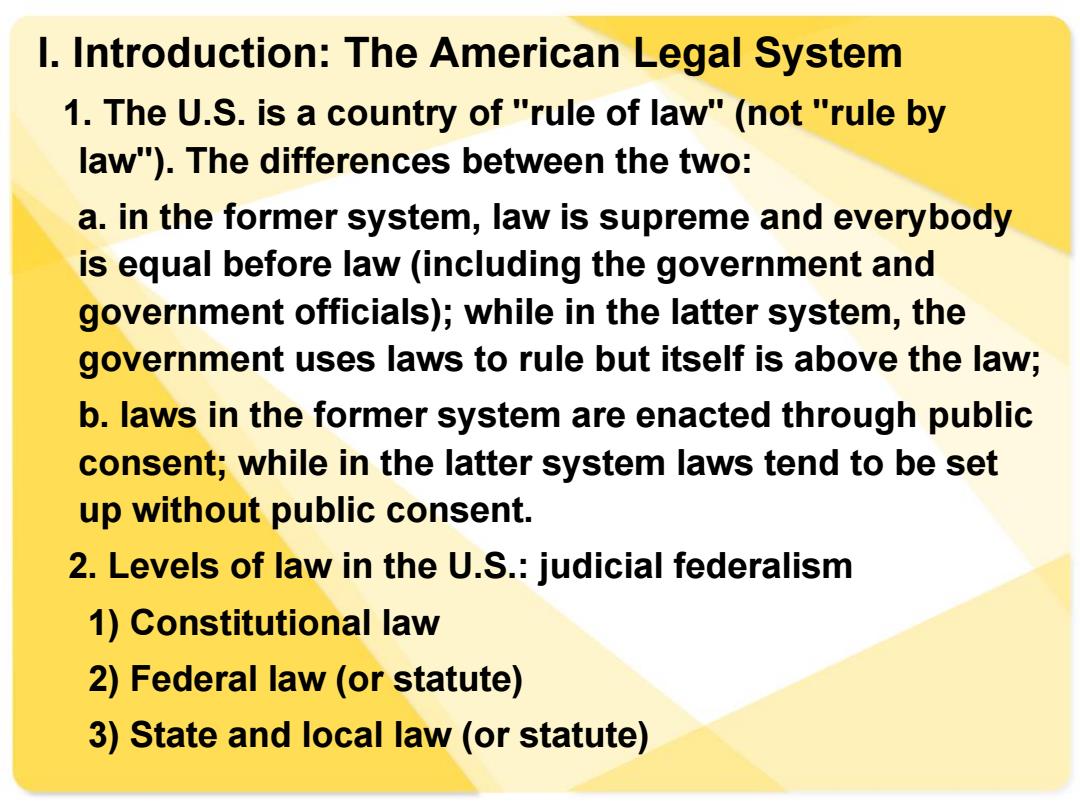
I.Introduction:The American Legal System 1.The U.S.is a country of "rule of law"(not "rule by law").The differences between the two: a.in the former system,law is supreme and everybody is equal before law(including the government and government officials);while in the latter system,the government uses laws to rule but itself is above the law; b.laws in the former system are enacted through public consent;while in the latter system laws tend to be set up without public consent. 2.Levels of law in the U.S.:judicial federalism 1)Constitutional law 2)Federal law (or statute) 3)State and local law (or statute)
I. Introduction: The American Legal System 1. The U.S. is a country of "rule of law" (not "rule by law"). The differences between the two: a. in the former system, law is supreme and everybody is equal before law (including the government and government officials); while in the latter system, the government uses laws to rule but itself is above the law; b. laws in the former system are enacted through public consent; while in the latter system laws tend to be set up without public consent. 2. Levels of law in the U.S.: judicial federalism 1) Constitutional law 2) Federal law (or statute) 3) State and local law (or statute)
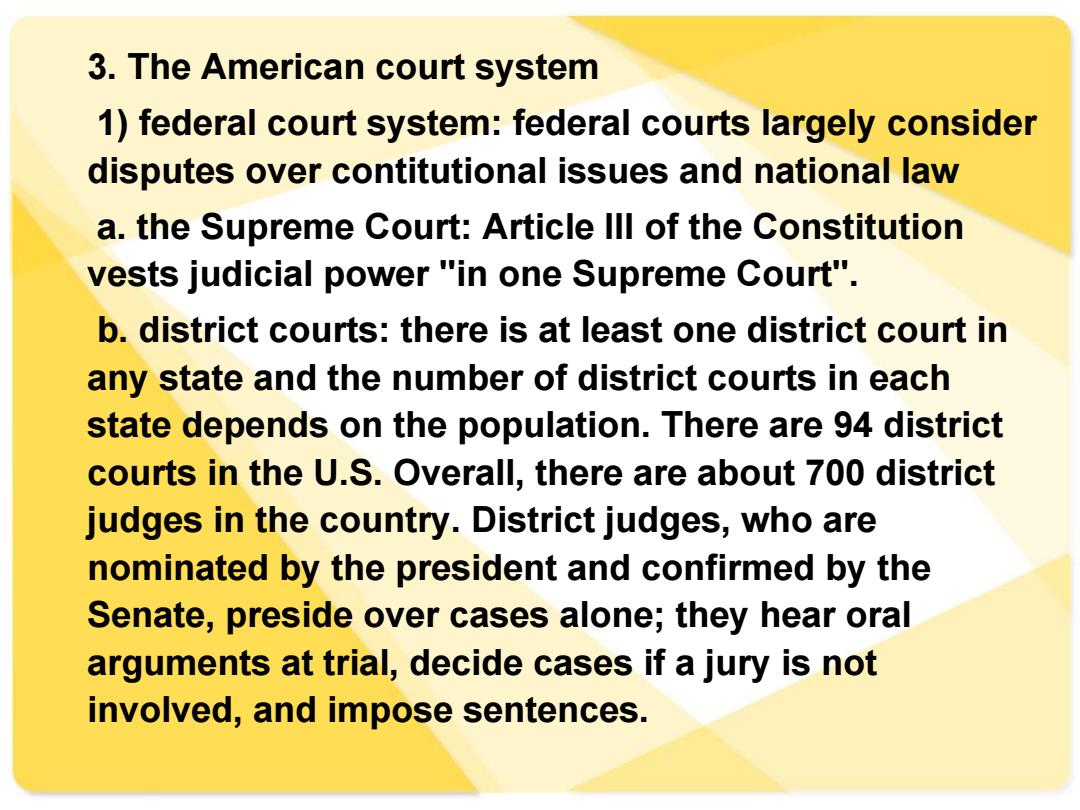
3.The American court system 1)federal court system:federal courts largely consider disputes over contitutional issues and national law a.the Supreme Court:Article lll of the Constitution vests judicial power "in one Supreme Court". b.district courts:there is at least one district court in any state and the number of district courts in each state depends on the population.There are 94 district courts in the U.S.Overall,there are about 700 district judges in the country.District judges,who are nominated by the president and confirmed by the Senate,preside over cases alone;they hear oral arguments at trial,decide cases if a jury is not involved,and impose sentences
3. The American court system 1) federal court system: federal courts largely consider disputes over contitutional issues and national law a. the Supreme Court: Article III of the Constitution vests judicial power "in one Supreme Court". b. district courts: there is at least one district court in any state and the number of district courts in each state depends on the population. There are 94 district courts in the U.S. Overall, there are about 700 district judges in the country. District judges, who are nominated by the president and confirmed by the Senate, preside over cases alone; they hear oral arguments at trial, decide cases if a jury is not involved, and impose sentences
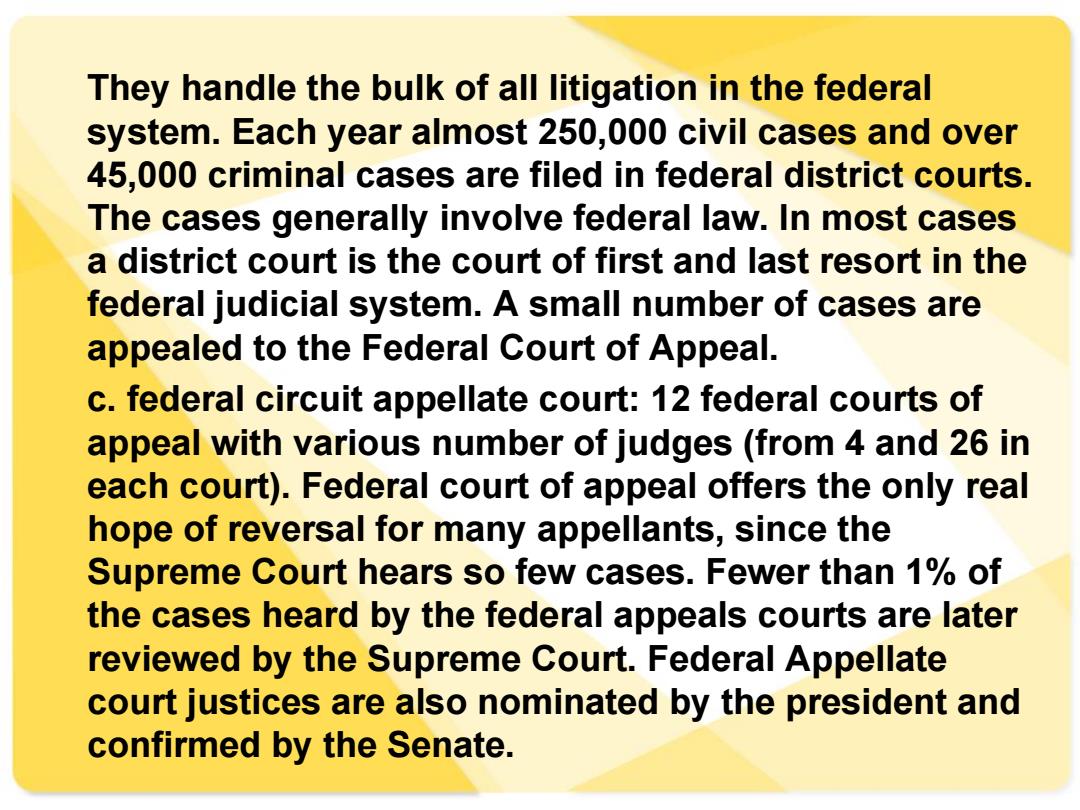
They handle the bulk of all litigation in the federal system.Each year almost 250,000 civil cases and over 45,000 criminal cases are filed in federal district courts. The cases generally involve federal law.In most cases a district court is the court of first and last resort in the federal judicial system.A small number of cases are appealed to the Federal Court of Appeal. c.federal circuit appellate court:12 federal courts of appeal with various number of judges(from 4 and 26 in each court).Federal court of appeal offers the only real hope of reversal for many appellants,since the Supreme Court hears so few cases.Fewer than 1%of the cases heard by the federal appeals courts are later reviewed by the Supreme Court.Federal Appellate court justices are also nominated by the president and confirmed by the Senate
They handle the bulk of all litigation in the federal system. Each year almost 250,000 civil cases and over 45,000 criminal cases are filed in federal district courts. The cases generally involve federal law. In most cases a district court is the court of first and last resort in the federal judicial system. A small number of cases are appealed to the Federal Court of Appeal. c. federal circuit appellate court: 12 federal courts of appeal with various number of judges (from 4 and 26 in each court). Federal court of appeal offers the only real hope of reversal for many appellants, since the Supreme Court hears so few cases. Fewer than 1% of the cases heard by the federal appeals courts are later reviewed by the Supreme Court. Federal Appellate court justices are also nominated by the president and confirmed by the Senate
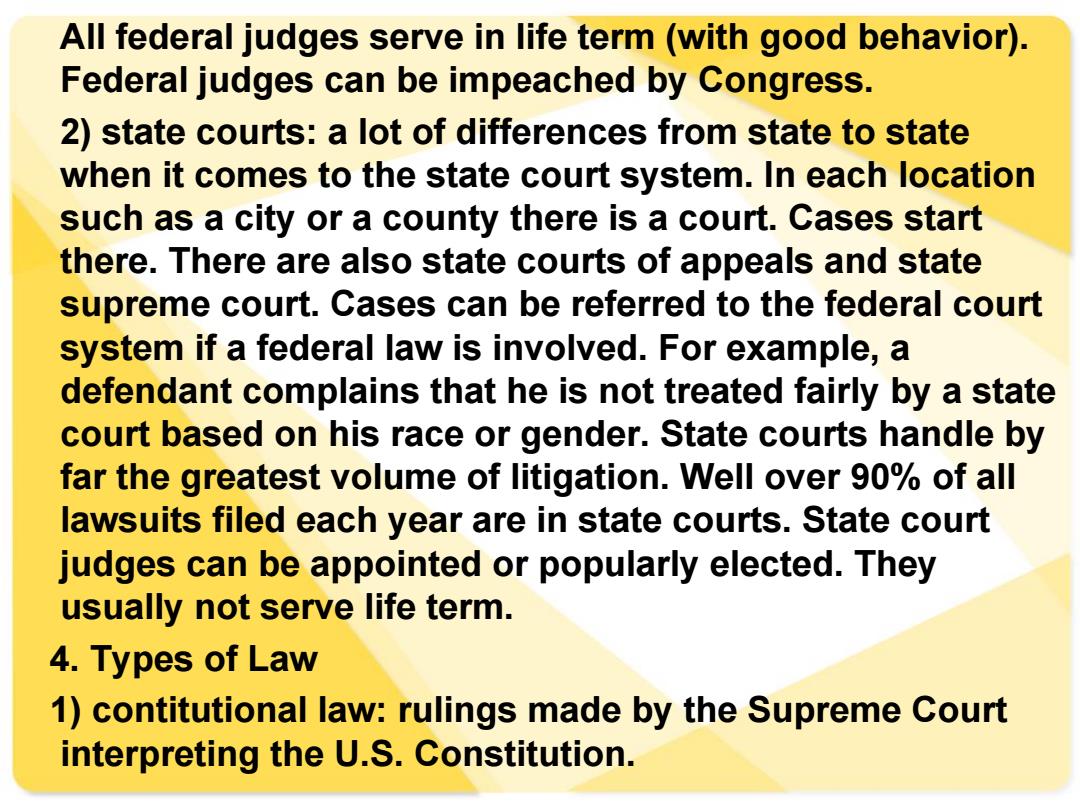
All federal judges serve in life term (with good behavior). Federal judges can be impeached by Congress. 2)state courts:a lot of differences from state to state when it comes to the state court system.In each location such as a city or a county there is a court.Cases start there.There are also state courts of appeals and state supreme court.Cases can be referred to the federal court system if a federal law is involved.For example,a defendant complains that he is not treated fairly by a state court based on his race or gender.State courts handle by far the greatest volume of litigation.Well over 90%of all lawsuits filed each year are in state courts.State court judges can be appointed or popularly elected.They usually not serve life term. 4.Types of Law 1)contitutional law:rulings made by the Supreme Court interpreting the U.S.Constitution
All federal judges serve in life term (with good behavior). Federal judges can be impeached by Congress. 2) state courts: a lot of differences from state to state when it comes to the state court system. In each location such as a city or a county there is a court. Cases start there. There are also state courts of appeals and state supreme court. Cases can be referred to the federal court system if a federal law is involved. For example, a defendant complains that he is not treated fairly by a state court based on his race or gender. State courts handle by far the greatest volume of litigation. Well over 90% of all lawsuits filed each year are in state courts. State court judges can be appointed or popularly elected. They usually not serve life term. 4. Types of Law 1) contitutional law: rulings made by the Supreme Court interpreting the U.S. Constitution
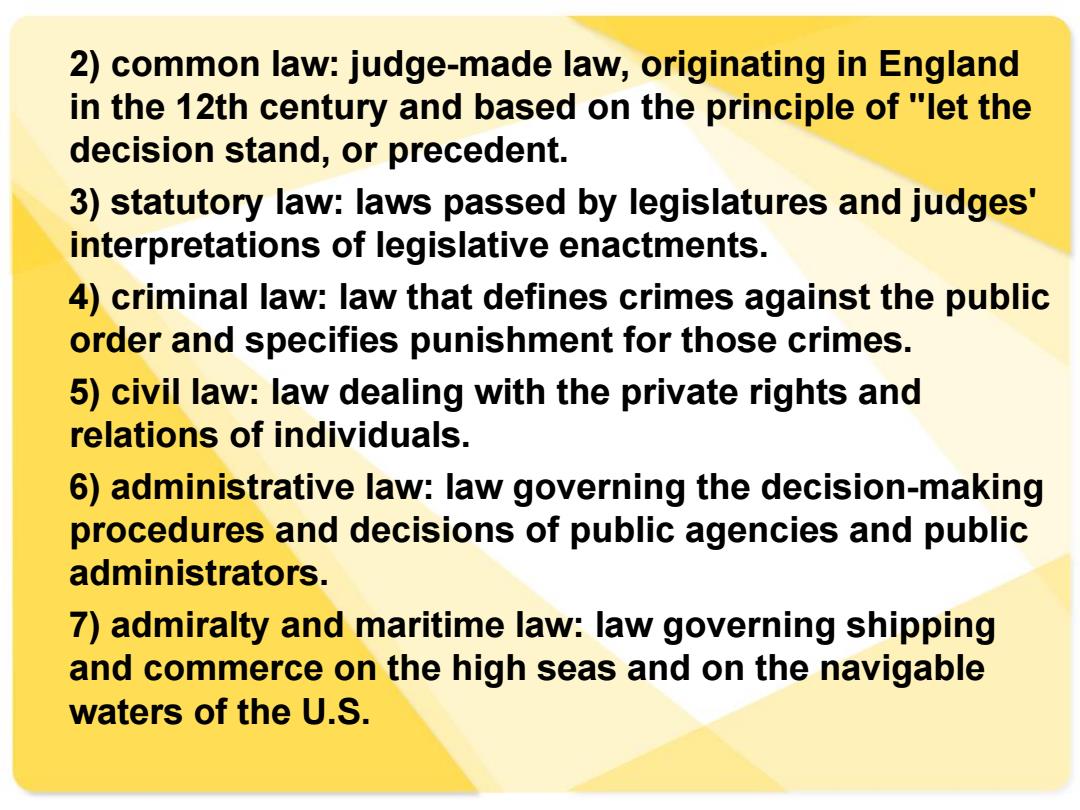
2)common law:judge-made law,originating in England in the 12th century and based on the principle of "let the decision stand,or precedent. 3)statutory law:laws passed by legislatures and judges' interpretations of legislative enactments. 4)criminal law:law that defines crimes against the public order and specifies punishment for those crimes. 5)civil law:law dealing with the private rights and relations of individuals. 6)administrative law:law governing the decision-making procedures and decisions of public agencies and public administrators. 7)admiralty and maritime law:law governing shipping and commerce on the high seas and on the navigable waters of the U.S
2) common law: judge-made law, originating in England in the 12th century and based on the principle of "let the decision stand, or precedent. 3) statutory law: laws passed by legislatures and judges' interpretations of legislative enactments. 4) criminal law: law that defines crimes against the public order and specifies punishment for those crimes. 5) civil law: law dealing with the private rights and relations of individuals. 6) administrative law: law governing the decision-making procedures and decisions of public agencies and public administrators. 7) admiralty and maritime law: law governing shipping and commerce on the high seas and on the navigable waters of the U.S
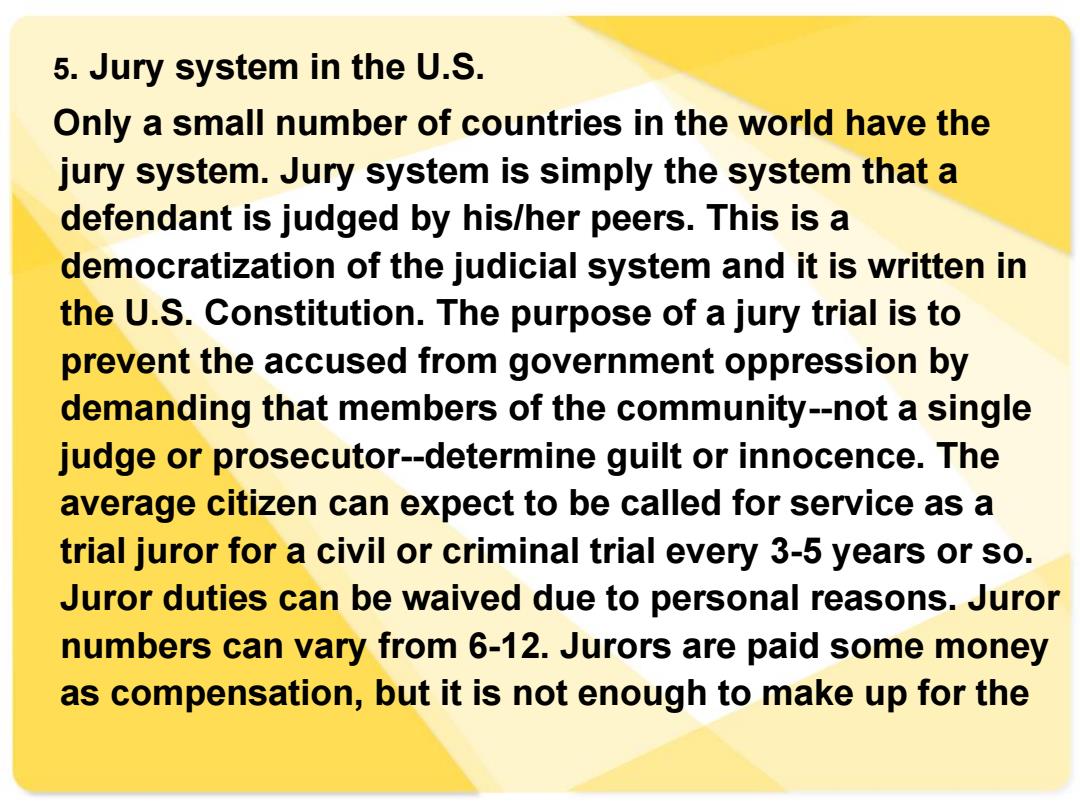
5.Jury system in the U.S. Only a small number of countries in the world have the jury system.Jury system is simply the system that a defendant is judged by his/her peers.This is a democratization of the judicial system and it is written in the U.S.Constitution.The purpose of a jury trial is to prevent the accused from government oppression by demanding that members of the community--not a single judge or prosecutor--determine guilt or innocence.The average citizen can expect to be called for service as a trial juror for a civil or criminal trial every 3-5 years or so. Juror duties can be waived due to personal reasons.Juror numbers can vary from 6-12.Jurors are paid some money as compensation,but it is not enough to make up for the
5. Jury system in the U.S. Only a small number of countries in the world have the jury system. Jury system is simply the system that a defendant is judged by his/her peers. This is a democratization of the judicial system and it is written in the U.S. Constitution. The purpose of a jury trial is to prevent the accused from government oppression by demanding that members of the community--not a single judge or prosecutor--determine guilt or innocence. The average citizen can expect to be called for service as a trial juror for a civil or criminal trial every 3-5 years or so. Juror duties can be waived due to personal reasons. Juror numbers can vary from 6-12. Jurors are paid some money as compensation, but it is not enough to make up for the
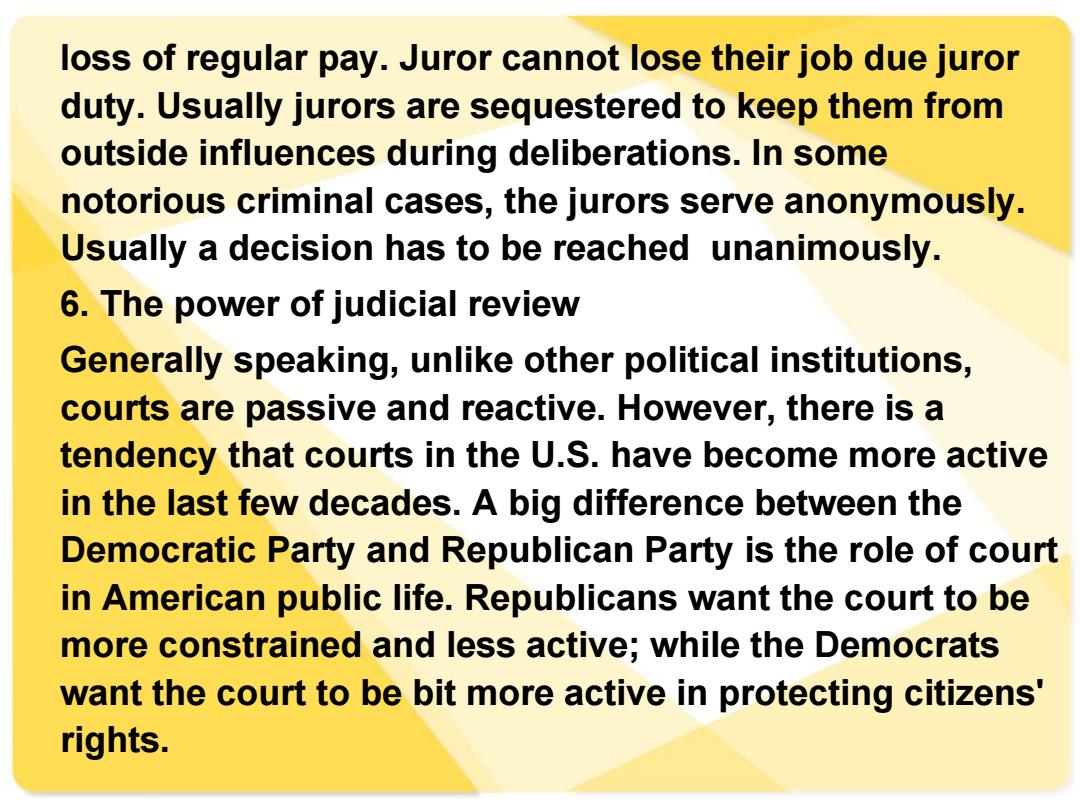
loss of regular pay.Juror cannot lose their job due juror duty.Usually jurors are sequestered to keep them from outside influences during deliberations.In some notorious criminal cases,the jurors serve anonymously. Usually a decision has to be reached unanimously. 6.The power of judicial review Generally speaking,unlike other political institutions, courts are passive and reactive.However,there is a tendency that courts in the U.S.have become more active in the last few decades.A big difference between the Democratic Party and Republican Party is the role of court in American public life.Republicans want the court to be more constrained and less active;while the Democrats want the court to be bit more active in protecting citizens' rights
loss of regular pay. Juror cannot lose their job due juror duty. Usually jurors are sequestered to keep them from outside influences during deliberations. In some notorious criminal cases, the jurors serve anonymously. Usually a decision has to be reached unanimously. 6. The power of judicial review Generally speaking, unlike other political institutions, courts are passive and reactive. However, there is a tendency that courts in the U.S. have become more active in the last few decades. A big difference between the Democratic Party and Republican Party is the role of court in American public life. Republicans want the court to be more constrained and less active; while the Democrats want the court to be bit more active in protecting citizens' rights
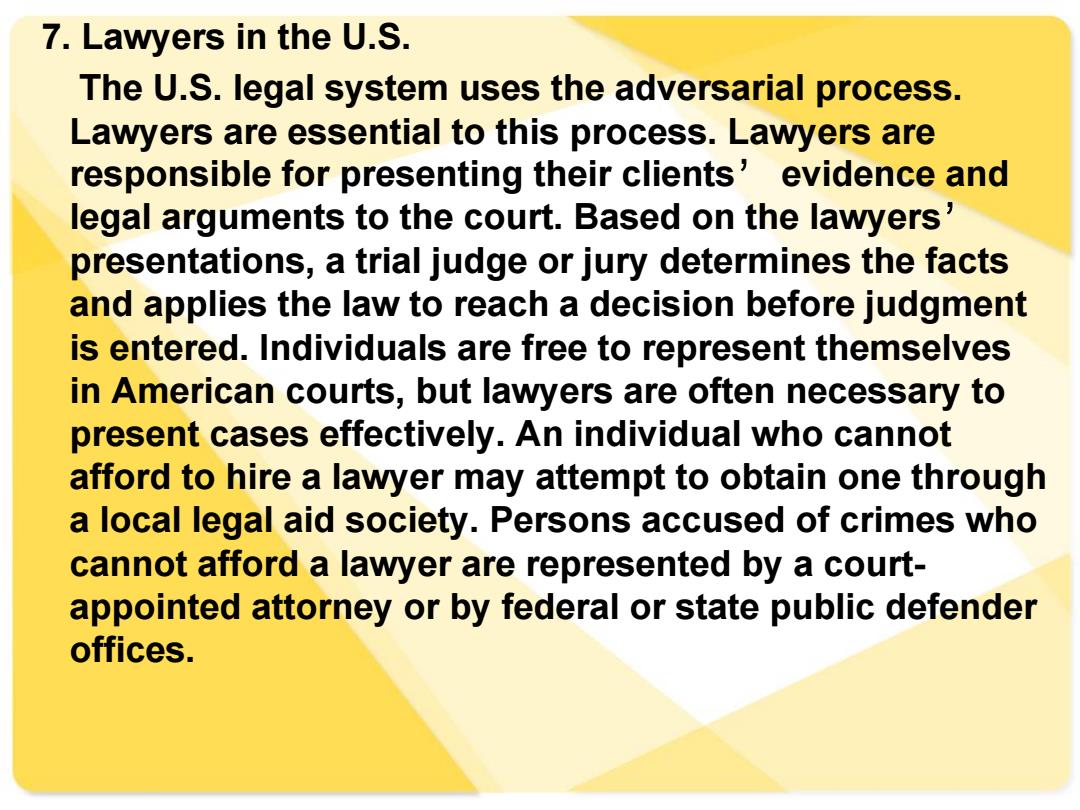
7.Lawyers in the U.S. The U.S.legal system uses the adversarial process. Lawyers are essential to this process.Lawyers are responsible for presenting their clients'evidence and legal arguments to the court.Based on the lawyers' presentations,a trial judge or jury determines the facts and applies the law to reach a decision before judgment is entered.Individuals are free to represent themselves in American courts,but lawyers are often necessary to present cases effectively.An individual who cannot afford to hire a lawyer may attempt to obtain one through a local legal aid society.Persons accused of crimes who cannot afford a lawyer are represented by a court- appointed attorney or by federal or state public defender offices
7. Lawyers in the U.S. The U.S. legal system uses the adversarial process. Lawyers are essential to this process. Lawyers are responsible for presenting their clients’ evidence and legal arguments to the court. Based on the lawyers’ presentations, a trial judge or jury determines the facts and applies the law to reach a decision before judgment is entered. Individuals are free to represent themselves in American courts, but lawyers are often necessary to present cases effectively. An individual who cannot afford to hire a lawyer may attempt to obtain one through a local legal aid society. Persons accused of crimes who cannot afford a lawyer are represented by a court- appointed attorney or by federal or state public defender offices

American lawyers are licensed by the individual states in which they practice law.There is no national authority that licenses lawyers.Most states require applicants to hold a law degree (Juris Doctor)from an accredited law school.An American law degree is a postgraduate degree awarded at the end of a three-year course of study.(Normally individuals complete four years of college/university before attending law school).Also, most states require that applicants for a license to practice law pass a written bar examination and meet certain standards of character.Do lawyers in the U.S. make a lot of money?The answer is yes and no.It depends what kind of law he practice and what law firm he works in.Lawyers and judges have totally different reputations.Judges (who are formal lawyers)are much trusted in the U.S.while lawyers are not quite trusted by the general public in the U.S
American lawyers are licensed by the individual states in which they practice law. There is no national authority that licenses lawyers. Most states require applicants to hold a law degree (Juris Doctor) from an accredited law school. An American law degree is a postgraduate degree awarded at the end of a three-year course of study. (Normally individuals complete four years of college/university before attending law school). Also, most states require that applicants for a license to practice law pass a written bar examination and meet certain standards of character. Do lawyers in the U.S. make a lot of money? The answer is yes and no. It depends what kind of law he practice and what law firm he works in. Lawyers and judges have totally different reputations. Judges (who are formal lawyers) are much trusted in the U.S. while lawyers are not quite trusted by the general public in the U.S